Piolets d'Or Announces the "Significant Ascents" of 2023
This list of 68 climbs is effectively a "long list" used to select nominees of the prestigious alpine award.

This is an area of pristine wilderness, home to Zambia’s only black rhinos, its elephant stronghold and one of the highest lion densities in the region. With Brent, our guide, and Lazarus, the scout, in the lead and Special, our tea bearer and extra set of sharp eyes, bringing up the rear; we had come to one of the most remote bush camps in Africa, Mwaleshi Camp.

Africa’s Great Rift Valley extends down into north-eastern Zambia, and it is here that the Luangwa River has, over millennia, carved a uniquely beautiful landscape.
North Luangwa is a vast tract of land, covering 4,636 square km and offering one of the last true truly wild experiences in Zambia. Part of the beauty of North Luangwa is experiencing Africa as it was, untouched, where you are simply an observer. A walking safari in North Luangwa is the ultimate way of experiencing such a truly remote place; it is definitely not the place for a Big Five ‘box ticking’ type of trip. North Luangwa is a place for total isolation, an intimate, personal experience in one of the last great wildlife areas on the continent. Few roads and seemingly even fewer people, you are very unlikely to see anyone other than your guide, camp staff and fellow camp guests for the duration of your safari.
Although it had been declared a Game Reserve in 1938, North Park (as it is commonly known) was not open to anyone other than the Game Department for more than 30 years, until in 1972 it eventually became a National Park. In the early 80s, one company was granted a concession to run walking safaris in North Luangwa, and for a number of years they remained the only safari operators in the park. In 1989, scientists Mark and Delia Owens, of ‘Cry of the Kalahari’ fame, set up a research station in the park, and it was through their presence and as a way of curbing poaching in the park, that authorities allowed a handful of other operators to bring limited numbers of people into the park for walking safaris. (The Owen’s North Luangwa story can be read in ‘Survivors Song/The Eye of the Elephant’.) Even now the North Park is very tightly controlled, has some of the most zealous game rangers in the country and is not open to the general public. There are no permanent lodges and the only way to visit the park is through one of the few safari operators licensed to conduct walking safaris.

Single file we set off, final instructions ringing in our ears… “no loud noises, no bright clothing, keep behind the guide, pay attention, DO NOT wander off.”
I have been going on safari in Africa for 20+ years and I have never had an experience to match the days we spent in North Luangwa.
We walked and walked, through long grass, across rivers, ducking under branches and occasionally stopping to untangle ourselves from the thorn bushes commonly referred to as ‘wait a bit’ bushes. The ‘bush’ is very different when experienced on foot, you suddenly become aware of every slight noise or rustle in the undergrowth, twigs cracking underfoot, bird calls, the alarm noises of puku and impala as they catch sight of you, and the occasional distant roar of a lion or not so distant trumpet of an elephant keeps you very aware of your surroundings… and your mortality!
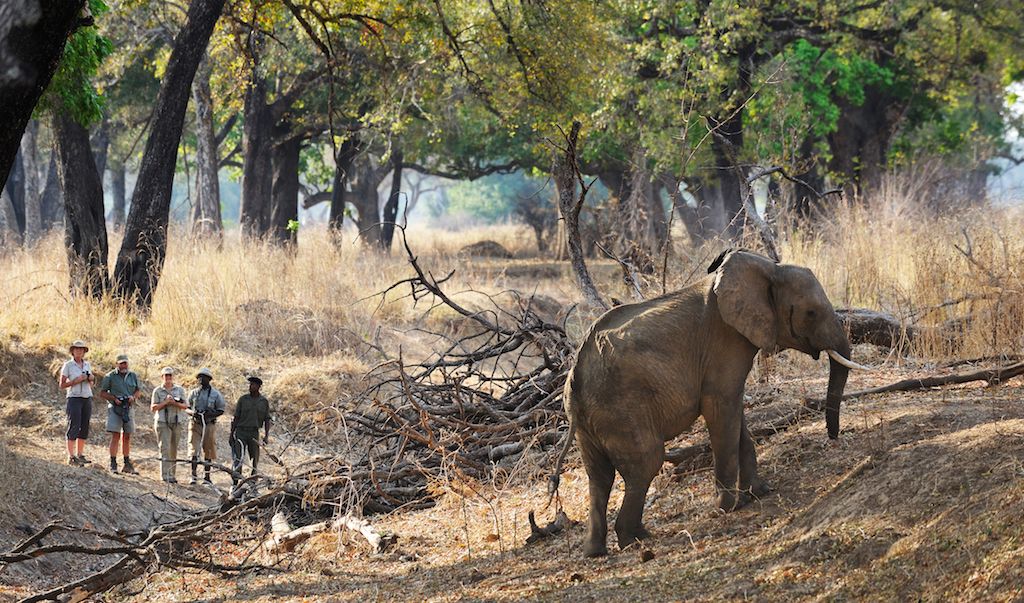
Our first afternoon walk lasted about three hours and gave us a taste of the routine to expect over the next few days. We saw so much that would normally be missed sitting in a safari vehicle on a traditional ‘game drive’. The Luangwa Valley is a great place for bird watchers, with approximately 400 of Zambia’s 750 recorded bird species being found here. We witnessed the ‘rolling’ flight displays of the lilac breasted rollers, the insect catching antics of the bee eaters, the ungainly flight pattern of hundreds of hornbills who seem so poorly designed when it comes to aerodynamics. There are about 12 different weaver bird species in North Luangwa, including, to some bird watcher’s delight, the East African chestnut-mantled sparrow weaver; we managed to get an up-close look at the various style of nest design of many of these weavers.
[gallery type="rectangular" size="full" ids="8418,8417,8415"]
We came across a mother squirrel panicking in the bushes, rushing back and forth, emitting a high pitched alarm call as she sensed danger to her young. Interestingly we learnt, that a mother squirrel will chew discarded snake skins and spit them at her babies, so as to help disguise their ‘squirrely scent’ from snake predators. We also learnt that by flicking her tail rapidly, she confuses a snake’s infrared detection sensing abilities and making it think the squirrel’s tail is another snake.
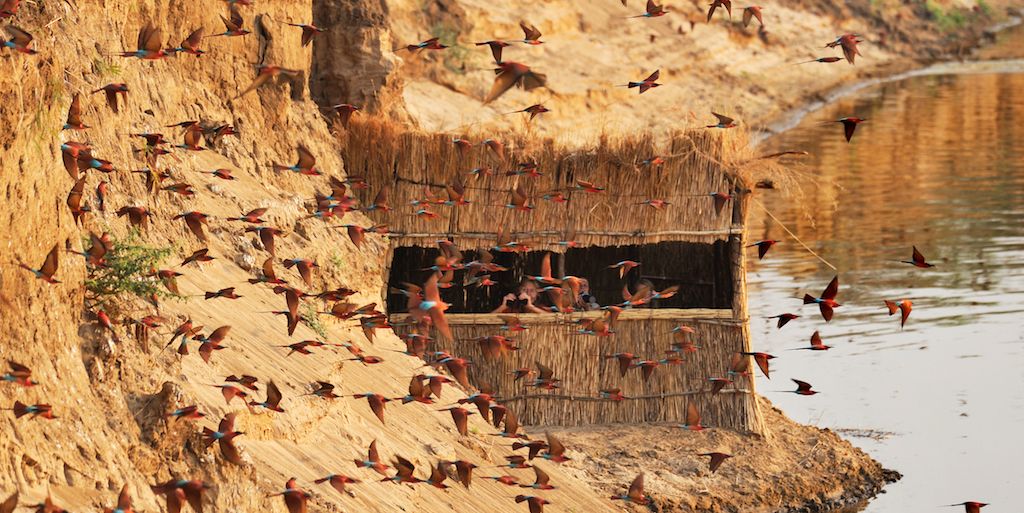
We watched the sunset orange, pink and scarlet on the water as we walked along the riverbank. My appetite has a tendency to make its presence loudly clear, and my stomach certainly knew it was time to head back to camp long before the rest of my body was ready to quit… this was not helped by the persistent smell of the native ‘potato bush’ (phyllanthus reticulatis), the smell of which reminded me tantalizingly of fish and chips and made my tummy rumble even louder, no doubt startling elephants near and far, with their ability to detect low-frequency rumblings from many kilometers away!
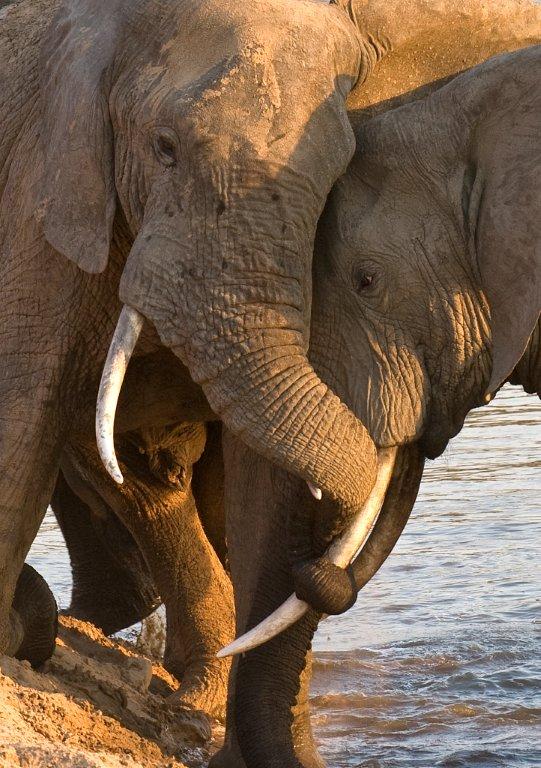
Back in camp that night we had one of those true ‘Out of Africa’ experiences; shower water heated by a fire, drinks in chairs overlooking the now darkened river, dinner by lantern light, whilst the noises of the bush carried on around us; and of course when we got back to our ‘room’ the beds had been turned down and mosquito nets firmly secured over them. As I drifted off to sleep I noticed the sounds of elephants tearing down branches and munching on vegetation very close by. Suddenly, I was rudely awakened, by my husband, who remembering I had brought an orange with me into the room, half-jokingly, was trying to convince me to get out of my comfortable bed, find the orange and take it outside… in case the elephants got the scent of it and came in to find it! Needless to say, I did not get out of my bed and he clearly wasn’t sufficiently concerned to get out of his either. The next morning we woke to find both the orange and our room unscathed. It was only when he saw fruit salad at breakfast that he grudgingly admitted that perhaps the kitchen, with its clearly plentiful supply of fruit, might have been a more obvious target for an elephant looking for a healthy midnight snack.
A typical day’s walking safari in North Luangwa starts at about 5am (even earlier in the hotter months). We were woken with a jug of warm water being passed through the ‘window’ in the bathroom and after some haphazard ablutions, we met for coffee and breakfast around the campfire on the riverbank. 5.30am and we set off (with our team of Brent, Lazarus and Special) for what would be about a five hour walk. Taking off our shoes we crossed the shallow, but surprisingly chilly, Mwaleshi River, while our eyes adjusted to the growing light. We walked on through sand, over river pebbles, past woodland and grassland, watching as the world woke up around us. A few nocturnal creatures rustled in the undergrowth as they set off for home and bed whilst the birds and other daytime creatures started to wake up.
[gallery type="square" size="large" ids="8413,8412"]
We had been walking for a while, without seeming to see very much, when suddenly my husband saw a hyena on the opposite bank. She was clearly either heavily pregnant or had grossly overeaten the night before, because her stomach was pendulous and she lay lazily on the cool, damp river sand. She seemed unconcerned by our presence, presumably because we had the river between us, and we spent quite a while watching her while she watched us back.
It was a great sighting, spoilt only by the line “I spotted a spotted hyena,” which my husband apparently found greatly amusing and kept repeating to me at regular intervals as we continued our walk.
As we left the hyena we ‘spotted’ a couple of Cookson’s wildebeest (one of the valley’s endemic subspecies) and then a lone bull elephant walking along the top of the opposite bank. We followed along on our side of the river, until he reached the spot where we had been planning to cross.
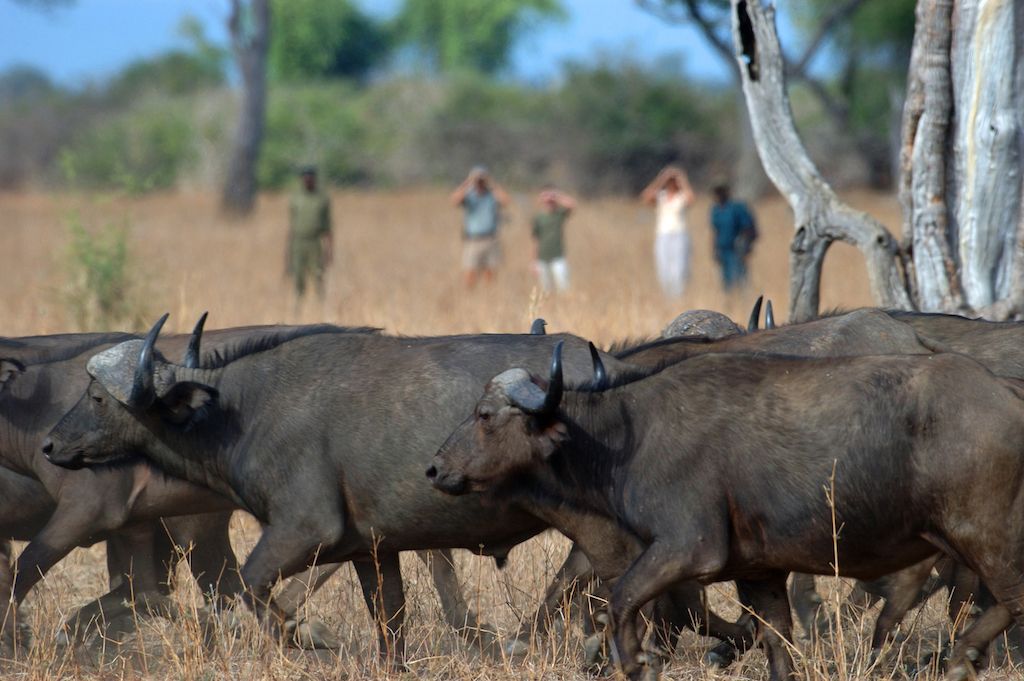
At this point he found a tree laden with his perfect breakfast fruits and paused for a leisurely meal. We were not about to disturb him, and as the place we wanted to cross the river was directly under the tree he had chosen, we waited our turn. It wasn’t too long before he finished and came down to the river’s edge to cross to our side of the water. As we were on foot we decided ‘safety first’ and backed up a fair distance and waited. As the bull got halfway across the river the wind changed direction and he suddenly smelt us… stopping still with his ears waving wildly and his trunk up scenting the air. We backed up a little further, then a little further and then a little further still! Ultimately deciding we didn’t seem too much of a threat, the elephant continued across the river, eventually vanishing into the thick vegetation.

In the 1970s the elephant population in the North Luangwa was about 120,000, but a large scale culling programme, followed by huge levels of poaching in the 70s and 80s decimated the herds to less than 5,000. The estimated population now is about 25,000, though sightings are still relatively scarce and the elephants are still pretty shy and skittish. Year by year the population is growing and the herds are calming down.
Poaching also led to the total decimation of rhino in the park, however some exciting developments have happened on that front too. North Luangwa, following a black rhino reintroduction programme that began in 2003, is now home to Zambia’s only black rhino population. Five black rhino were initially introduced into a large fenced off ‘intensive protection zone’ in the heart of the park and ten more were added a few years later. The North Luangwa Conservation Programme, a partnership between the Frankfurt Zoological Society and Zambia Department of National Parks and Wildlife, has been a success and the numbers have now increased and the sanctuary area has been extended greatly to accommodate the animals.
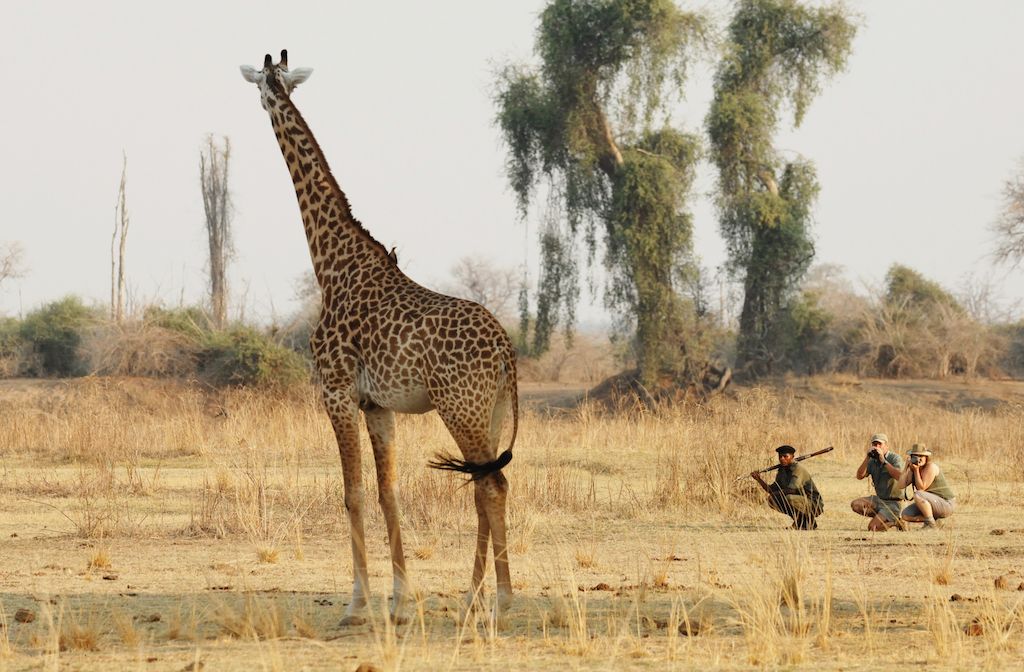
Founded in 1986 the North Luangwa Conservation Programme has focused on protecting the 22,000 square km park. In a recent effort to fight the rising levels of poaching in the area, a canine anti-poaching unit has been established. Trained ‘sniffer dogs’ are stationed at park gates, border areas and at strategic road blocks outside the park, successfully curbing the trafficking of illegal products like ivory and bush meat. The unit has also been pretty successful at the detection of firearms and illegally harvested timber.
Returning to camp, lunch and a siesta in the hottest part of the day, was followed by another three hour walk in the afternoon. This time heading upstream we ventured into parts of the park we hadn’t been before. As we walked we could see the route taken by elephants who had been passing this way for many, many years. As the elephants had passed they had eaten the slightly ‘gingery chocolatey’ tasting fruit of the ilala palm and then ‘deposited’ the seeds, leaving behind a trail of palm trees of various sizes, much like a modern day bush version, of Hansel and Gretel’s fairytale trail of breadcrumbs. As the sun started to set we ended our afternoon’s walk up high on an embankment with two elephants having a dust bath immediately below us, both completely oblivious to our presence. A lovely way to end the day.
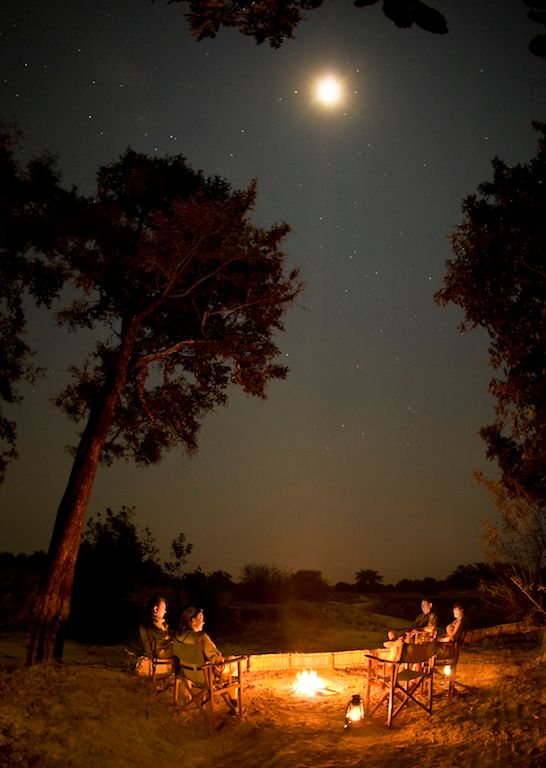
Dinner that night was, in timeless safari style; wine and a three course candlelit meal on the banks of the river. We could hear different prides of lions roaring on all sides and the occasional startled trumpet of a young elephant across the water. We saw the moon and stars above us and heard mysterious splashing sounds in the river as animals waded across under cover of darkness. Sadly though a 5am wake up, 8 hours of walking and the knowledge that we were rising again at 5am the following day, sent us to bed before it got too late. Too tired to worry about oranges and elephants, and lulled to sleep by the sounds of the lions and distant hyenas, I fell rapidly into a deep sleep.
The 5am wake up seemed much easier the next morning, and after another breakfast by the campfire, we set off for our final walk in the park. This time we drove to the Luangwa River and walked through the riverine forest, down to the banks of the river. As we walked Brent paused, “can you smell that popcorn kind of smell” he asked. And indeed there was a remarkably strong scent of popcorn. “That’s the scent markings of a genet cat” he informed us. Numerous years of safaris I have never before known that. Leaving the popcorn behind, we walked down to the Luangwa River, which forms the border of the national park.
Huge pods of hippos wallowed in the water beneath us and a few brave fisherman sat on the opposite bank, outside the confines of the park, mending their nets and cleaning their catch.

I could have spent hours watching the hippos and their antics. Teeth baring, territorial displays, jostling for position in the shallow water, their grunting, groaning, roaring and wheezing. Ox peckers trying to land on the hippos’ backs were constantly and comically repelled by splashes as the hippos flapped their ears and tails spraying their backs with water. Not long after landing and start to ‘peck’, they would be dislodged and taking briefly to the air would settle on another plump grey back, momentarily, before the splashing was repeated and they were on the move again.
Because of its remoteness, most people coming to North Luangwa fly into the park. We however had driven and had a long journey home. Reluctantly we had to leave the hippos and head off on the bumpy 12km road up the escarpment to the park gate, and then the 400km journey home. Half way to the gate we rounded the corner to find a site that North Luangwa is famous for a huge herd of buffalos, numbering in the hundreds, the perfect sighting to end our safari on.
It is worth noting that North Luangwa is only open in the dry season, from June to October and that the camps are rebuilt every year so as to have minimal impact of the ecosystem. Access to the park in the wet season is virtually impossible
We stayed at Mwaleshi Camp in North Luangwa which is owned and operated by Remote Africa Safaris.
Feature image courtesy of Remote Africa Safaris
2nd best newsletter in the universe